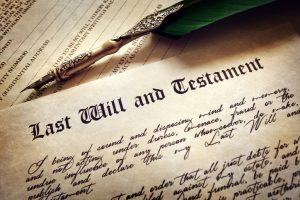
It is important to remember that a Will only covers assets in your name alone which are called probate assets. A Will does not cover assets with a named beneficiary or assets titled jointly. Those assets are called non-probate assets and pass by operation of law.
In Pennsylvania, if you are married and you die without a Will, what your spouse gets depends on whether or not you have living parents or children or grandchildren. If you don’t have living parents or children, then your spouse inherits all of your intestate property. But if you do, they and your spouse will share your intestate property as follows:
If you die with a surviving spouse and parents but no children. Your surviving spouse inherits the first $30,000 of your intestate property, plus 1/2 of the balance.
Example: Charles is married to Lisa, and his father is still alive. Charles owns a house in joint tenancy with Lisa, and Lisa is also the named beneficiary of Charles retirement account. When Charles dies, Lisa automatically inherits the house and any remaining retirement funds; those things are not probate property. Charles also has $350,000 worth of additional property that would have passed under a Will if he had made one. Lisa inherits $190,000 worth of that property – that is, $30,000 plus $160,000 worth of the remaining $320,000. Charles parents inherit the remaining half or $160,000.
If you die with children from your surviving spouse. Your surviving spouse inherits the first $30,000 of your intestate property, plus half of the balance. Your children with that spouse inherit the remaining half.
Example: Sam is married to Jane, and they have two grown children. Sam and Jane own a large bank account in joint tenancy, and Bill took out a life insurance policy naming Jane as the beneficiary. When Bill dies, Jane receives the life insurance policy proceeds and inherits the bank account outright. Bill also owns $450,000 worth of property that would have passed under a will, so Karen inherits $240,000 worth of that property – that is, $30,000 plus $210,000 of the remaining $420,000. Their two children inherit the remaining half $210,000 or $105,000 each.
If you die with children who are not the descendants of your surviving spouse. Your spouse inherits 1/2 of your intestate property, and your children inherit the other half.
Example: Tom is married to Kim and also has a 12-year-old daughter, Sara from a previous marriage. Tom owns a house in joint tenancy with Kim, plus $200,000 worth of additional assets that would have passed under a Will if Tom had one. When Tom dies, Kim inherits the house outright and $100,000 worth of Tom’s probate property. Tom’s daughter Sara inherits the remaining half or $100,000 of Tom’s probate property.
These rules do not apply if you are separated from your spouse and your spouse has willfully neglected you or refused to physically, financially or emotionally support you for at least one year. They also do not apply if you die in the state of Pennsylvania during divorce proceedings from your spouse.
If you die without a Will and don’t have any family, your property will “escheat” to the Commonwealth of Pennsylvania after remaining unclaimed for 7 years. However, this rarely happens because the laws are designed to get your property to anyone who was even remotely related to you. For example, your property won’t go to the state if you leave a spouse, children, grandchildren, parents, grandparents, siblings, nieces, nephews, or cousins.
If you have any questions regarding Pennsylvania Intestacy Laws contact Gregory J. Spadea at 610-521-0604. The Law Offices of Spadea & Associates, LLC specializes in Probate, Estate Administration and Estate and Tax Litigation.








Speak Your Mind